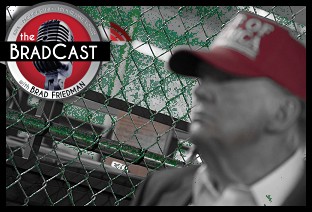 Before my head explodes on today's BradCast while speaking with our guest about the latest ruling from the Federal Elections Commission (FEC) on foreign money in American elections, we open with some seemingly better news --- and then close later with some definitely better news. [Audio link to show is posted below this summary.]
Before my head explodes on today's BradCast while speaking with our guest about the latest ruling from the Federal Elections Commission (FEC) on foreign money in American elections, we open with some seemingly better news --- and then close later with some definitely better news. [Audio link to show is posted below this summary.]
First up, three noteworthy points came out of the COP26 U.N. climate summit in Glasgow on Wednesday, even if all three points are still somewhat vague and it remains to be seen if all 196 participating nations can unanimously (as required) come to an agreement by the end of this week's conference to cut enough global warming-causing emissions to save humanity. Is that too much to ask?
The three noteworthy points which we discuss, and quickly explain why they are so noteworthy, regard 1) a draft text [PDF] of a final agreement for COP26 (which could change before all is said and done), that actually mentions the need to phase out coal and subsidies for fossil fuels. Though that would seem obvious, it would actually be a landmark statement. 2) A pledge was announced between six major automakers (including Ford and GM!) and 30 national governments to phase out the sale of all new internal combustion vehicles worldwide by 2040 and in "leading markets" by 2035. And 3) A "surprise joint announcement" from the U.S. and China to work together to slow global warming in this decade (including reductions of emissions from both methane and coal!) and to ensure the Glasgow conference ends in success. All three points are actually big news, even if each comes with some vagaries and caveats and, in and of themselves, are nowhere near enough to save us. But all three are important and even landmark early steps toward that end, for reasons we discuss.
Next up, the FEC has affirmed that it's perfectly legal under federal law for foreign countries to spend as much as they like on American ballot referenda, at least in states that don't have laws outlawing it. Their recent 4 to 2 ruling comes from a 2018 Montana complaint where a Canadian subsidiary of an Australian firm had spent money to back a ballot measure placing new restrictions on hard rock mining in the state. It also comes on the heels of a ballot proposition last week in Maine where a record $89 million was spent on campaigns for and against a ballot initiative to halt a $1 billion cross-border corridor for a high-impact, clean electricity transmission line to bring power to the state generated by a Quebec-owned hydro-power company.
The FEC ruling allows unlimited millions from foreign individuals, companies and nations to be dumped into American ballot campaigns. We're joined today to discuss this seemingly mind-blowing FEC ruling by BRENDAN FISCHER, Director of the Federal Reform Program at the nonpartisan Campaign Legal Center in Washington D.C. He explains the gaping loophole in the Federal Election Campaign Act (FECA) that bars foreign money in American candidate elections, but not, apparently, on ballot referenda and propositions, which the FEC says federal law does not consider to be an "election"!
While objectionable and a "kind of insane outcome" to the Montana case, according to Fischer, "this is not a totally crazy or unfounded interpretation" of the federal statute. In this case, it was, in fact, the Democratic Chair of the FEC who voted with all three Republicans on the Commission. Moreover, Fischer says, in Maine, there had been a bipartisan bill adopted by the state legislature to ban foreign money in ballot initiative campaigns, which was ultimately vetoed by the state's Democratic Governor. "That was really controversial in Maine," Fischer explains, "and voters, both Republican and Democrat, were unhappy about it."
He notes that elected officials from both parties in Congress have expressed concern about this problem with FECA and have put forward legislation to fix it. "There's a surprising amount of bipartisan support for plugging this loophole," Fischer tells me. "It also should be noted that the Freedom To Vote Act --- the big voting rights and campaign finance reform bill, supported by Joe Manchin --- also includes a provision that would extend the foreign national prohibition to state and local ballot measures."
Fischer also rings in today on the scathing report [PDF] issued this week by the U.S. Office of Special Counsel, led by a Republican Trump-appointee, finding that more than a dozen top Trump Administration officials --- often repeatedly and knowingly --- violated the Hatch Act's ban on federal employees using their office to campaign for candidates (specifically for Trump) in the run-up to the 2020 election. While top Trump officials, including Sec. of State Mike Pompeo, violated the decades-old Act, the punishment for doing so --- at least for political appointees, if not career federal employees --- is left up to the discretion of the sitting President. Thus, naturally, under our disgraced former President, none of the thirteen who violated the Act faced any consequences from the federal law. Fischer offers his thoughts on whether the Hatch Act, like FECA, can or should be reformed by this Congress.
Finally, Tuesday night offered some actual bad news for that disgraced former President, as a federal judge rejected his attempt to block to the release of January 6-related White House documents subpoenaed by the U.S. House Select Committee investigating the Trump-incited insurrection at the U.S. Capitol. U.S. District Judge Tanya Chutkan thoroughly shut down Trump's claims that Executive Privilege "exists in perpetuity" for him and that he otherwise faces irreparable harm if the National Archives releases the subpoenaed documents as scheduled this Friday. Chutkan's scathing 39-page ruling confirms the well-established principle that only a SITTING President has the power to exercise Executive Privilege to block the release of documents and that "Presidents are not kings, and Plaintiff is not President.”
Ouch. Trump's attorneys have, naturally, vowed to appeal. But the ruling is also very bad news for his disgraced former advisor Steve Bannon, who is facing a criminal Contempt of Congress charge referred to the Dept. of Justice by the U.S. House after his refusal to answer a lawful subpoena from the Select Committee. His basis for refusing to do so was that Trump told him his own documents and testimony were exempt under Executive Privilege. They aren't, because the former President has no such privilege. Neither are the documents and testimony of dozens of others subpoenaed by the Committee, all of whom, like Bannon, could be facing a year in prison for defying lawful Congressional subpoenas. As you know, this story will continue to develop in the days ahead...
(Snail mail support to "Brad Friedman, 7095 Hollywood Blvd., #594 Los Angeles, CA 90028" always welcome too!)
|


 Repub Support for Immigrants Skyrockets Amid Trump's Crackdown: 'BradCast' 7/14/25
Repub Support for Immigrants Skyrockets Amid Trump's Crackdown: 'BradCast' 7/14/25  Sunday 'Totally Predictable' Toons
Sunday 'Totally Predictable' Toons Democracy STILL Our Best Way Out of This Mess -- And Repubs Know It: 'BradCast' 7/10/25
Democracy STILL Our Best Way Out of This Mess -- And Repubs Know It: 'BradCast' 7/10/25 'Green News Report' 7/10/25
'Green News Report' 7/10/25
 'Mass Shooter Subsidy'?: More Dumb, Deadly Stuff in Trump's New Law: 'BradCast' 7/9/25
'Mass Shooter Subsidy'?: More Dumb, Deadly Stuff in Trump's New Law: 'BradCast' 7/9/25  Trump's New Law Supersizes ICE, Mass Detention, Militarization: 'BradCast' 7/8/25
Trump's New Law Supersizes ICE, Mass Detention, Militarization: 'BradCast' 7/8/25  'Green News Report' 7/8/25
'Green News Report' 7/8/25 Texas Flooding Tragedy Was Both Predictable and Predicted: 'BradCast' 7/7/25
Texas Flooding Tragedy Was Both Predictable and Predicted: 'BradCast' 7/7/25 Sunday 'Big Billionaire Bonanza' Toons
Sunday 'Big Billionaire Bonanza' Toons Sunday 'Total Obliteration' Toons
Sunday 'Total Obliteration' Toons 'Green News Report' 6/26/25
'Green News Report' 6/26/25 Thank You For Your Attention to This Matter:
Thank You For Your Attention to This Matter: Mamdani Primary 'Win' Augurs New Era of Rising Progressives: 'BradCast' 6/25/25
Mamdani Primary 'Win' Augurs New Era of Rising Progressives: 'BradCast' 6/25/25 U.S. Authoritarianism Under-way (But We're Still Here to Fight It): 'BradCast' 6/24/25
U.S. Authoritarianism Under-way (But We're Still Here to Fight It): 'BradCast' 6/24/25 'Anti-War' Trump Attacks Iran on False Claims About WMD: 'BradCast' 6/23/25
'Anti-War' Trump Attacks Iran on False Claims About WMD: 'BradCast' 6/23/25 Senate Health Care Cuts 'More Extreme' Than House Version: 'BradCast' 6/19/25
Senate Health Care Cuts 'More Extreme' Than House Version: 'BradCast' 6/19/25 What 'Anti-War President'? MAGA Civil War Over Trump, Iran: 'BradCast' 6/18/25
What 'Anti-War President'? MAGA Civil War Over Trump, Iran: 'BradCast' 6/18/25 Trump's 'Remigration' is Code for 'Ethnic Cleansing': 'BradCast' 6/17/25
Trump's 'Remigration' is Code for 'Ethnic Cleansing': 'BradCast' 6/17/25 Last Weekend Today: 'BradCast' 6/16/25
Last Weekend Today: 'BradCast' 6/16/25
 VA GOP VOTER REG FRAUDSTER OFF HOOK
VA GOP VOTER REG FRAUDSTER OFF HOOK Criminal GOP Voter Registration Fraud Probe Expanding in VA
Criminal GOP Voter Registration Fraud Probe Expanding in VA DOJ PROBE SOUGHT AFTER VA ARREST
DOJ PROBE SOUGHT AFTER VA ARREST Arrest in VA: GOP Voter Reg Scandal Widens
Arrest in VA: GOP Voter Reg Scandal Widens ALL TOGETHER: ROVE, SPROUL, KOCHS, RNC
ALL TOGETHER: ROVE, SPROUL, KOCHS, RNC LATimes: RNC's 'Fired' Sproul Working for Repubs in 'as Many as 30 States'
LATimes: RNC's 'Fired' Sproul Working for Repubs in 'as Many as 30 States' 'Fired' Sproul Group 'Cloned', Still Working for Republicans in At Least 10 States
'Fired' Sproul Group 'Cloned', Still Working for Republicans in At Least 10 States FINALLY: FOX ON GOP REG FRAUD SCANDAL
FINALLY: FOX ON GOP REG FRAUD SCANDAL COLORADO FOLLOWS FLORIDA WITH GOP CRIMINAL INVESTIGATION
COLORADO FOLLOWS FLORIDA WITH GOP CRIMINAL INVESTIGATION CRIMINAL PROBE LAUNCHED INTO GOP VOTER REGISTRATION FRAUD SCANDAL IN FL
CRIMINAL PROBE LAUNCHED INTO GOP VOTER REGISTRATION FRAUD SCANDAL IN FL Brad Breaks PA Photo ID & GOP Registration Fraud Scandal News on Hartmann TV
Brad Breaks PA Photo ID & GOP Registration Fraud Scandal News on Hartmann TV  CAUGHT ON TAPE: COORDINATED NATIONWIDE GOP VOTER REG SCAM
CAUGHT ON TAPE: COORDINATED NATIONWIDE GOP VOTER REG SCAM CRIMINAL ELECTION FRAUD COMPLAINT FILED AGAINST GOP 'FRAUD' FIRM
CRIMINAL ELECTION FRAUD COMPLAINT FILED AGAINST GOP 'FRAUD' FIRM RICK SCOTT GETS ROLLED IN GOP REGISTRATION FRAUD SCANDAL
RICK SCOTT GETS ROLLED IN GOP REGISTRATION FRAUD SCANDAL VIDEO: Brad Breaks GOP Reg Fraud Scandal on Hartmann TV
VIDEO: Brad Breaks GOP Reg Fraud Scandal on Hartmann TV RNC FIRES NATIONAL VOTER REGISTRATION FIRM FOR FRAUD
RNC FIRES NATIONAL VOTER REGISTRATION FIRM FOR FRAUD EXCLUSIVE: Intvw w/ FL Official Who First Discovered GOP Reg Fraud
EXCLUSIVE: Intvw w/ FL Official Who First Discovered GOP Reg Fraud GOP REGISTRATION FRAUD FOUND IN FL
GOP REGISTRATION FRAUD FOUND IN FL

































